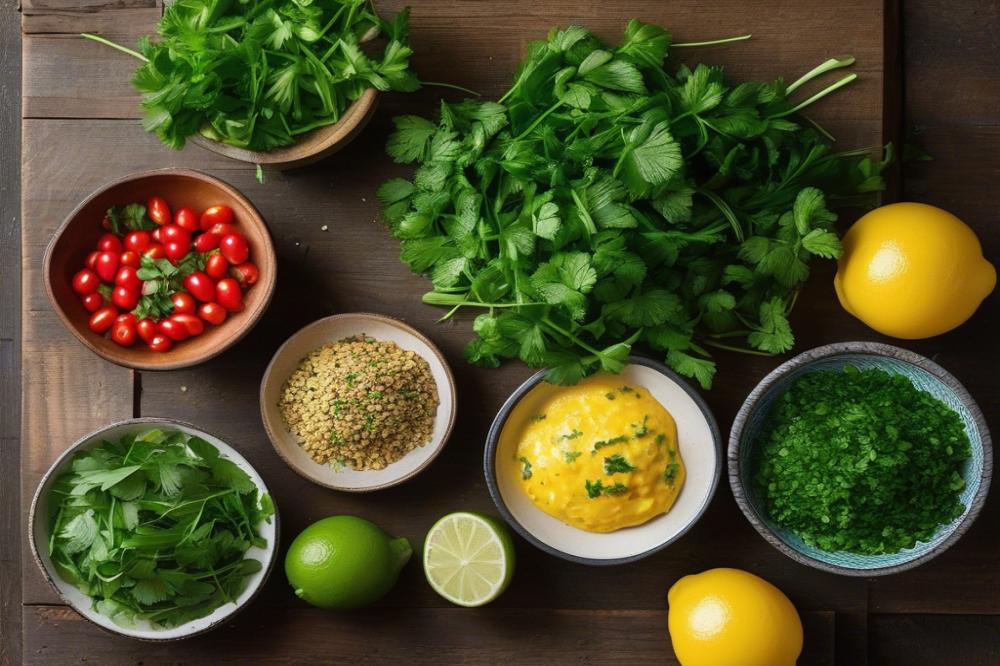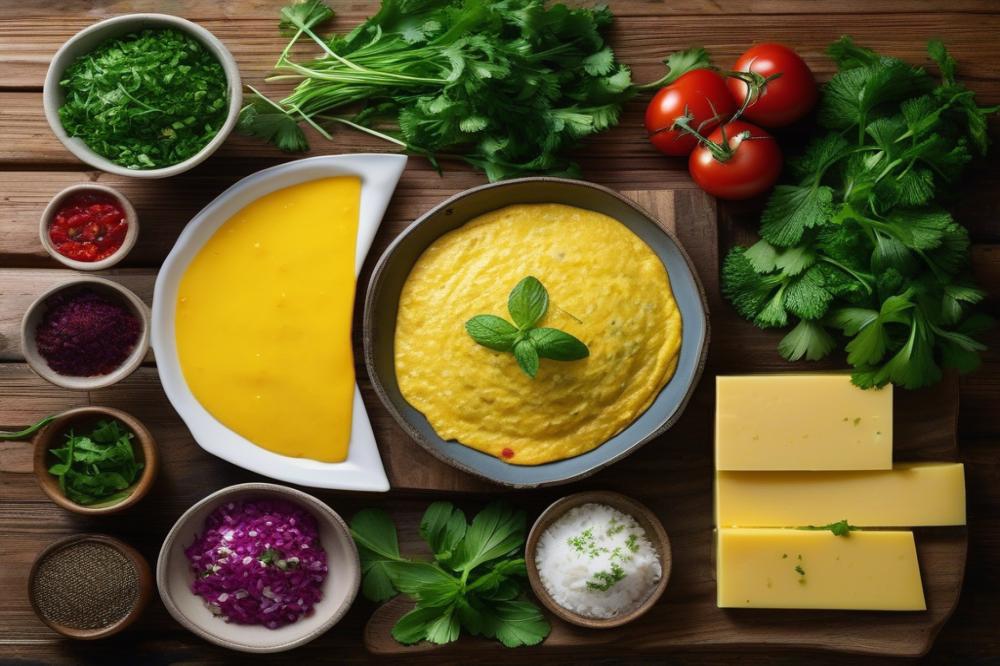The Essence of Lebanese Cuisine
Lebanese cuisine is a vibrant tapestry woven from fresh herbs, vegetables, and rich flavors. It emphasizes the importance of seasonal ingredients, often found in local markets. This approach creates dishes that are not only delicious but also full of nutrients. The use of herbs such as parsley, mint, and spinach is especially prominent, adding brightness to meals and enhancing their health benefits.
One dish that embodies this love for fresh ingredients is the Lebanese Omelette, or Ejjeh. This traditional recipe is greatly cherished, often enjoyed for breakfast by families across Lebanon. It is common to find this omelette served at the start of the day, warming hearts and nourishing bellies. Made with a base of eggs and an array of fresh herbs, it offers a unique blend of flavors in every bite.
The health attributes of this dish are noteworthy. Packed with protein from the eggs and vitamins from the herbs, it stands out as a nutritious option. Families appreciate the ways this healthy recipe can be prepared quickly, making it an ideal choice for busy mornings. Sharing meals like Ejjeh fosters connection and brings joy into the daily routine. Cooking tips abound for making this omelette, allowing each cook to add personal touches while preserving its traditional essence.
Lebanese Omelette: The traditional recipe

Ejjeh is more than just a dish in Lebanese culture; it represents a deep connection to heritage and community. This omelette stands out as a popular breakfast item that many families enjoy together. The colors and textures reflect the diversity of Lebanese cuisine. It showcases the bounty of local produce, highlighting the use of fresh herbs and vegetables.
Fresh ingredients are at the heart of this healthy recipe. Parsley, mint, and spinach are often used, each adding a distinct flavor. Eggs serve as a base, making this dish both nutritious and satisfying. The combination of these herbs not only enhances the taste but also represents the Mediterranean diet’s emphasis on plant-based foods.
When cooking ejjeh, attention to detail in preparation can elevate the meal. One essential cooking tip is to finely chop the herbs for a more unified texture. Using fresh ingredients, if possible, will enhance the flavors tremendously. This invites everyone to indulge in a dish that celebrates nature’s freshness.
The preparation of this traditional recipe often involves the whole family. Children can help wash and chop the greens, fostering a sense of togetherness. Eating ejjeh at breakfast brings warmth and comfort, setting a positive tone for the day ahead. It serves as a reminder of the importance of sharing meals in Lebanese culture.
Ultimately, ejjeh provides more than nourishment. It symbolizes a lifestyle that values health and community. This omelette encourages creativity in the kitchen, nourishing both body and soul. Its significance transcends mere sustenance; it reflects a rich tradition that continues to thrive in Lebanese homes today.
Ingredients and Quantities

To create the flavorful Lebanese Omelette, gather these ingredients. You will need:
- 4 large eggs
- 1 cup of fresh parsley, chopped
- 1/2 cup of fresh mint, chopped
- 1 cup of fresh spinach, chopped
- 1 small onion, finely chopped
- 1/2 teaspoon of salt
- 1/4 teaspoon of pepper
- 2 tablespoons of olive oil
Begin with the eggs. They are the foundation of this dish. Fresh herbs play a vital role. Parsley, with its bright green color and earthy flavor, adds freshness. Mint provides a refreshing contrast, while spinach brings both nutrition and color.
Onion contributes a gentle sweetness. Choose a small one, finely chopped, so it blends well into the mix. Salt and pepper enhance the flavor of the herbs and eggs. Olive oil is essential for cooking this breakfast delight.
This traditional recipe showcases the diversity of Lebanese cuisine. Many families often enjoy this dish for breakfast or a light meal. It’s a healthy recipe, packed with vitamins and flavor. Think about personalizing it by adding other herbs or vegetables. Cooking tips suggest letting the mixture rest before cooking for even better texture.
Gather these ingredients and prepare to enjoy a delicious and nutritious meal. It is perfect for sharing with family and friends. This Lebanese herb omelette is sure to impress with its vibrant flavors and textures.
Cooking Instructions

To begin your journey into making the traditional recipe for a Lebanese herb omelette, start by cracking the eggs into a mixing bowl. Whisk them thoroughly, incorporating a generous pinch of salt and a dash of pepper to enhance the flavor. The seasoning is crucial for a delightful breakfast.
Next, chop fresh parsley, mint, and spinach finely. Dice some onions too, as they add a wonderful depth to the dish. Mix these vibrant herbs and vegetables into the beaten eggs, ensuring they are evenly distributed. This mixture is where the essence of Lebanese cuisine shines through. Each herb brings its unique flavor, contributing to the overall healthiness of the omelette.
Heat a good amount of olive oil in a nonstick skillet on medium heat. The oil ensures the omelette will slide out easily once cooked. When the oil shimmers, it’s time to pour in the egg mixture. Spread it evenly across the pan, allowing it to settle gently.
Watch closely as it cooks. You’ll notice the edges starting to firm up while the center remains slightly runny. This is the perfect moment to fold the omelette in half. Use a spatula to carefully flip one side over the other. Cooking it for an additional 2-3 minutes will give you a perfectly cooked omelette.
Once done, slide it onto a serving plate. Consider garnishing with more fresh herbs for that extra pop of flavor. Serve warm, and enjoy this healthy recipe that embodies the soul of Lebanese cuisine. Cooking tips: Feel free to experiment with different herbs or add some cheese for a richer taste.
Nutritional Information

The Lebanese omelette, known as Ejjeh, is not just a tasty dish but also a nutritious one. The basic ingredients include eggs, various herbs, and spices. Let’s break down the nutritional components of this traditional recipe, highlighting their benefits.
Eggs serve as the primary protein source. Each large egg contains about 70 calories, 6 grams of protein, and 5 grams of fat. They also provide essential vitamins and minerals such as vitamin D, B12, and selenium.
Herbs like parsley, mint, and spinach add not only flavor but also important nutrients. Parsley is rich in vitamin K and vitamin C. Mint contributes to digestion and can add a refreshing taste. Spinach is well-known for its high iron content, making it beneficial for maintaining energy levels.
The calories provided by these herbs are minimal, but they offer numerous phytochemicals. These compounds have antioxidant properties, supporting overall health. Together, the eggs and herbs create a well-rounded breakfast option.
Carbohydrates are not a main ingredient in this dish, but some versions include a small amount of flour. This will add slightly to the carb count but keeps the omelette’s profile primarily high in protein and healthy fats.
Vitamins from this healthy recipe include vitamin A, which is vital for eye health, and vitamin K for bone health. The combination of ingredients in Ejjeh supports a balanced diet. Cooking tips include using fresh ingredients for maximum flavor and nutrient retention.
In summary, this delightful dish from Lebanese cuisine presents a variety of nutrients essential for daily health. Enjoying the omelette regularly can contribute positively to your diet, making it a worthy addition to any breakfast table.
Cooking Tips for Perfect Ejjeh
Choosing fresh herbs makes a significant difference in the flavor of your dish. Look for vibrant green parsley, and mint that is not wilted. Spinach should be crisp as well. Fresh herbs contribute to the unique taste typical of Lebanese cuisine. When selecting them, avoid those that show signs of browning or decay. Always wash herbs thoroughly to remove any dirt or pesticides.
Egg quality is crucial when preparing this dish. Opt for organic or free-range eggs when possible, as they tend to have richer flavors. Crack the eggs into a bowl and beat them well. Air incorporation during beating adds fluffiness. It’s a fundamental step in ensuring your omelette has a light texture.
For different tastes, consider adding various ingredients. Feta cheese can add a salty creaminess. Sun-dried tomatoes introduce a sweet and tangy element. These additions can transform the traditional recipe into something special. Alternatively, if someone prefers a spicier kick, adding chopped chili peppers works well. Each variation brings unique flavors while still honoring the essence of this healthy recipe.
Servings enhance the overall experience of the meal. Fresh-baked pita bread pairs wonderfully. It can be used for scooping the omelette, making each bite delightful. Additionally, a simple salad made of cucumbers and tomatoes can provide a refreshing contrast. Serving Ejjeh with yogurt adds creaminess and balances the dish. Breakfast can become more enjoyable with these sides to complement the main recipe.
The Value of Lebanese Herb Omelette Ejjeh
The Lebanese herb omelette Ejjeh is not just a delicious meal; it represents a healthier alternative for breakfast. Packed full of fresh herbs and eggs, this dish is simple yet nutritious. In many ways, it symbolizes the essence of traditional recipes that celebrate wholesome ingredients. By incorporating more herbs into your diet, you can enhance your meals with flavor and nutrition.
Trying this omelette can introduce you to the delightful world of Lebanese cuisine. Its versatility allows you to modify the recipe easily. You can add vegetables, spices, or even cheese to customize it to your taste. This makes it a fun option for families with different preferences.
Sharing a meal that has such a rich cultural background can be rewarding. When you sit down with loved ones to enjoy Ejjeh, you are not just eating; you are experiencing a piece of Lebanon’s culinary history. Encouraging the exploration of different cuisines fosters appreciation and understanding of global cultures. So, why not give this dish a try?
Embracing the healthy habits associated with dishes like this one can lead to positive changes in daily eating patterns. Its nutritious profile makes it an ideal choice for anyone seeking balance in their diet. The Lebanese herb omelette is more than just food; it’s a tradition that brings people together. With each bite, you contribute to the legacy of a beloved dish that has delighted many for generations.



